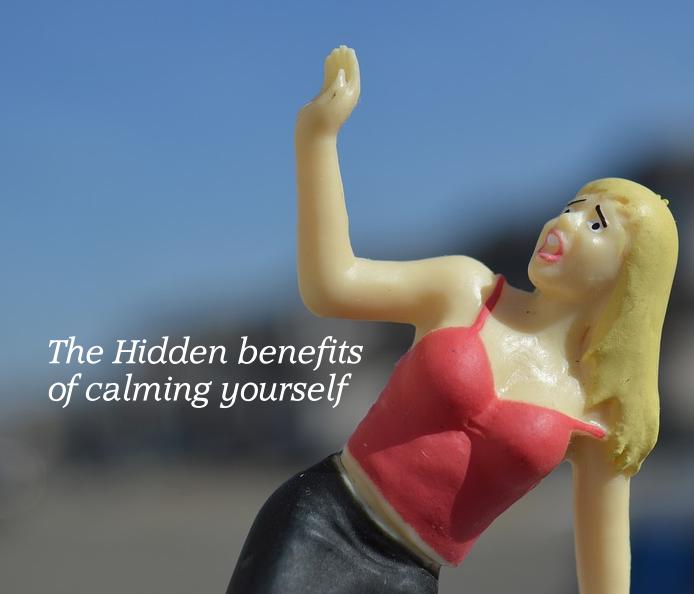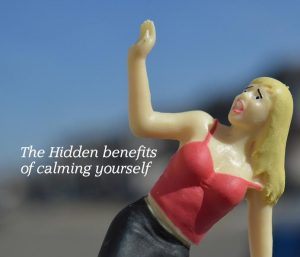Are you ready to take the steps to understand fear and learn the benefits of being able to calm yourself? This episode will walk you through both and help change the way you approach fearful situations.
I’ve been hearing a lot about fear lately, so it just made sense to do a post on what to do to calm yourself once fear or anxiety begin to set in. This type of post is important because I encounter all kinds of quotes online saying to stop being fearful but very few that tell you how to go about the delicate dance between recognizing fear and fighting it.
One of the first points that should be covered is that fear is a good thing. It is an evolutionary adaptation that alerts your body to be on guard and pushes you to be alert. That lump in the pit of your stomach might just be the thing that saved you long ago from all kinds of dangers from dinosaurs or tigers. It is part of that fight or flight response we hear so much about because it gets your body ready to do one or the other after you have assessed the situation.
It seems that in the present day the fears we encounter the most have nothing to do with survival but more about how we view ourselves in relation to others. Our most dominate fears are: the fear of failing, the fear of not living up to our imagined potential, and the fear that we will appear less capable in the eyes of others.
So what are some of the ways you can confront your fears and move on to do the things you are capable of doing?
Understand your fear patterns
By now you should have been in enough situations that cause you to go into fear mode. In other words you have a history – use it. Think back to a time similar to what you’re currently facing and things turned out just fine and ask yourself why. This tactic will point out the situations that tend to trigger your fear response so you can mentally right the ship. Or from another perspective, think of a time when your fears were justified and what you were able to do to turn things around. This last exercise serves two purposes in that it makes you consider what if’s; and provides reassurance that you have been able to overcome fearful situations in the past by taking some type of action. Your results may not have been perfect but if you’re listening or reading this, you did survive.
Develop a good support network for advice
Just like it always helps to have a second set of eyes to look over something, it can’t hurt to have the counsel of someone you trust. They know how you tend to approach things and can be helpful in validating some of the things you’re seeing or questioning part of your thinking. They can also serve as a short term mentor by providing ways that they have dealt with similar situations. Just remember not to wear out your welcome and abuse the advice they are willing to offer.
Use breath work exercises to calm yourself
Have you ever been upset and someone told you to take a deep breath and you dismissed their suggestion…? They were right. Once you become upset or anxious you go into what could be called “shallow breathing” sometimes without even  realizing it. Shallow breathing slows down the flow of oxygen to your brain which creates a loop pattern where your brain tells you to breathe faster to get more oxygen and the faster you breathe the more oxygen you need.
realizing it. Shallow breathing slows down the flow of oxygen to your brain which creates a loop pattern where your brain tells you to breathe faster to get more oxygen and the faster you breathe the more oxygen you need.
We often discount the benefit of breathing in decision making and controlling your mood when it plays a major role. Just before tackling a task that creates fear or anxiety, do a little breath work. Take a moment to sit upright and breathe in to the count of four allowing your stomach to extend through the breath and fall on the breath out also to the count of four. Doing this for two to five minutes will almost instantly calm you and provide the brain with badly needed oxygen to speed up and clear the thinking process. It’s simple, no one has to know you’re doing it and pays dividends in bringing you to a calmer mood.
The hidden benefits of calming
I know some of you who are going to say “but I work better under pressure” and that may be true but there is a difference between good stress and bad stress. Good stress is “I know what I need to do and I’m getting ready to do it.” Bad stress is “the world is going to come to an end if I don’t do whatever. Research has shown there is a price you pay throughout your body for fear or stress by trying to “will” yourself to remain in control. Maintaining what you think is control in stressful situations causes a drop in blood sugar which is exhausting and translates to requiring your body to work harder than it needs to.
Research has also shown this reaction is similar to what happens when you drink alcohol. Alcohol lowers blood sugar and in addition to working on parts of the brain it fatigues the body which limits your ability to maintain impulse control. In other words: poor decision making generally occurs near the end of the day. This explains why after a day of non-stop stress you feel physically drained. Being able to calm yourself so you can tackle a task means less wear and tear on the body as a whole in addition to decreasing impulsive decision making. And NO, a candy bar in the afternoon only makes the situation worse because it gives you a short burst of energy but also results in a huge drop once it has been used up by the body. There is much more benefit to breath work or a piece of fruit during a short walk in that green space down in the lobby. The both slow the body’s burn rate and aid in the intake of oxygen.
The tips I’ve given are not designed to do away with fear but more along the lines of helping you understand your fear patterns and then using various tools to tackle and then reframe them. A new you starts now…


